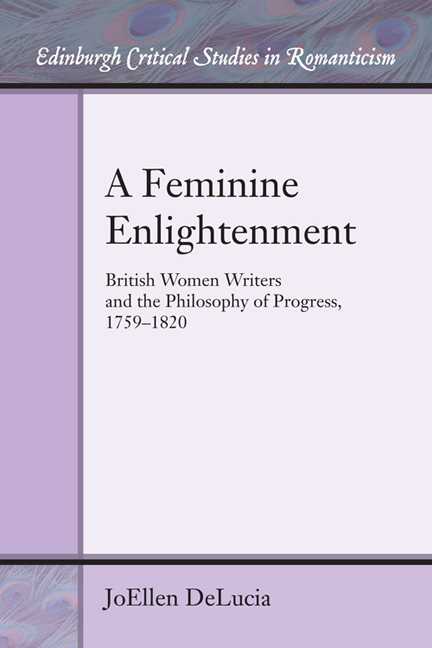Book contents
- Frontmatter
- Contents
- Acknowledgments
- Introduction: A Feminine Enlightenment?
- 1 The Progress of Feeling: The Ossian Poems and Adam Smith's Theory of Moral Sentiments
- 2 Ossianic History and Bluestocking Feminism
- 3 Queering Progress: Anna Seward and Llangollen Vale
- 4 Poetry, Paratext, and History in Radcliffe's Gothic
- 5 Stadial Fiction or the Progress of Taste
- Epilogue: Women Writers in the Age of Ossian
- Bibliography
- Index
1 - The Progress of Feeling: The Ossian Poems and Adam Smith's Theory of Moral Sentiments
Published online by Cambridge University Press: 05 August 2016
- Frontmatter
- Contents
- Acknowledgments
- Introduction: A Feminine Enlightenment?
- 1 The Progress of Feeling: The Ossian Poems and Adam Smith's Theory of Moral Sentiments
- 2 Ossianic History and Bluestocking Feminism
- 3 Queering Progress: Anna Seward and Llangollen Vale
- 4 Poetry, Paratext, and History in Radcliffe's Gothic
- 5 Stadial Fiction or the Progress of Taste
- Epilogue: Women Writers in the Age of Ossian
- Bibliography
- Index
Summary
Although James Macpherson and Adam Smith earned their places in the British cultural pantheon almost simultaneously, they appear to inhabit two different worlds: the Ossian poems (1760–3) imagine a Scottish past of Highland mists and long-gone Gaelic heroes, while Theory of Moral Sentiments (1759) belongs to the present and future of eighteenthcentury Britain, the expanding commercial empire theorized in Smith's more famous treatise The Wealth of Nations (1776). Superficially, Macpherson's translation and reconstruction of fragmented Celtic legends still circulating in the Highlands and Smith's study of modern sensibility appear unlikely companions. The Ossian poems recount the epic battles of a group of third-century Highland warriors and attempt to capture in print the existence of a particularly Scottish literary and cultural heritage. In contrast, Smith's study of modern sensibility creates a global map of feeling, charting the ways in which we feel for people we have never met and in some cases never even seen. Yet Smith and Macpherson's texts characterize the same historical moment and were hugely popular throughout the eighteenth and early nineteenth centuries, going through several editions. Smith revised and reworked his theory of feeling in six editions from 1759–90; similarly, Macpherson's poems went through several editions and were translated into numerous languages, including Polish and Greek. Both texts grappled with the internal and external expansion of the British Empire, particularly the changes wrought by the 1707 Act of Union, which united England and Scotland under one parliament, the failed Jacobite Rebellion in 1745, and the expansion of the British Empire after the Seven Years War.
Most importantly, for the purposes of this book, both texts have been cited by historians and literary critics as key to understanding the eighteenth century as an Age of Sensibility, a period that valued the cultivation of feeling as much as reasoned discourse. In the eighteenth century, discussions of the “progress of feeling” or “manners” were also debates about a civilizing process that mapped human development from the “rude” age depicted by Macpherson to the developed commercial society represented by Smith. Smith laid the groundwork for this debate in his Theory of Moral Sentiments.
- Type
- Chapter
- Information
- A Feminine EnlightenmentBritish Women Writers and the Philosophy of Progress, 1759-1820, pp. 19 - 49Publisher: Edinburgh University PressPrint publication year: 2015



